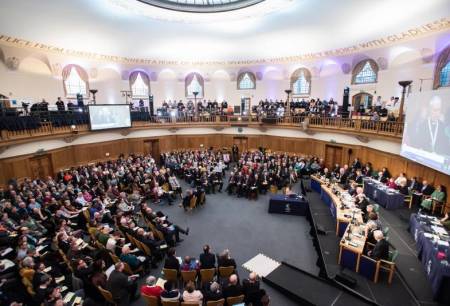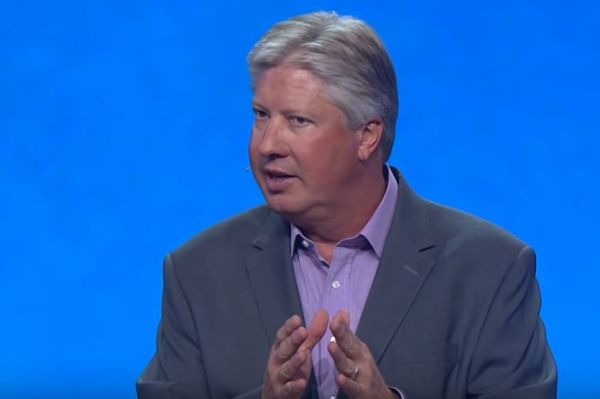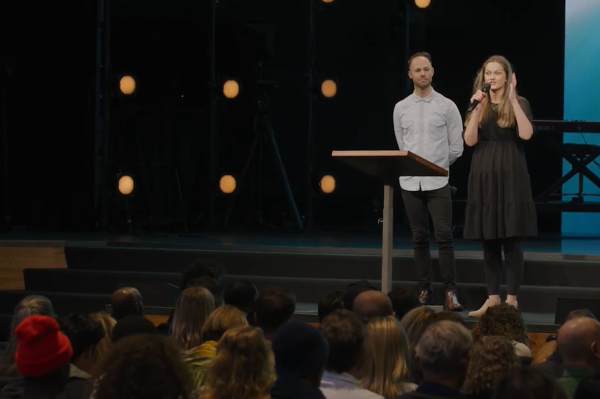Church of England backs plans to bless gay couples, considering gender-neutral pronouns for God

The Church of England voted Thursday to officially endorse plans for priests to offer prayers of blessing for same-sex couples, even as one church body is set to launch a project that could rethink using "gendered language" for God.
Members of the Church of England's General Synod approved plans to allow same-sex couples who have been joined in a civil marriage or civil partnership to come to church services and "receive God's blessing," according to a church statement.
The vote — which tallied 36 bishops in favor, four opposed and two abstained — also included language calling for the church to "lament and repent" for what officials said was "the failure of the Church" to welcome LGBT-identified people and for "harm" LGBT communities "have experienced — and continue to experience — in churches."
The motion also stated there would be no proposed change to the Church of England's "doctrine of marriage" and that any changes to the church's Prayers of Love and Faith "should not be contrary to or indicative of a departure from the doctrine of the Church of England."
As The Christian Post previously reported, bishops and pastors will not be required to bless same-sex couples as the prayers are will be "entirely discretionary" under the proposal.
Thursday's vote comes on the heels of a report stating the denomination will consider teaching that the God of the Bible is gender-neutral, which one church spokesman claims is "nothing new."
Details of the plans, first reported by The Telegraph, stem from the response of the Liturgical Commission, which oversees and prepares church and worship service, to a question about offering "more inclusive language" in its liturgy.
The question submitted by Rev. Joanna Stobart of the Diocese of Bath and Wells specifically asked about steps the Church of England could take to "offer congregants alternatives to referring to God with male pronouns," according to the Telegraph.
In response, Rev. Michael Ipgrave, the vice chair of the Liturgical Commission, said the panel, working with the Faith and Order Commission, has "been exploring the use of gendered language in relation to God for several years."
While no further details were disclosed, advocates for reform, such as Prof. Helen King, who is the vice chair of the General Synod's gender and sexuality group, said, "Questions around gendered language and God have been around for decades, if not centuries, but still have the power to bring out strong reactions.
"For some, God as father is helpful because of their own positive experiences of a loving parent," King said. "For others, God as father may reinforce a bad experience of a strict disciplinarian as their father. If we dig deeper, clearly God is not gendered, so why do we restrict our language for God in gendered ways?"
Under church law, any permanent changes involving gendered language — including but not limited to potentially rewriting passages from the Bible — would have to be agreed upon by a future meeting of Synod.
In a statement to CP, a church spokesperson said such considerations, despite the controversy they have already caused, are "nothing new."
"This is nothing new. Christians have recognized since ancient times that God is neither male nor female," the spokesperson wrote via email.
While asserting there are "absolutely no plans to abolish or substantially revise currently authorized liturgies," the official confirmed the Faith and Order Commission would consider these questions "as part of its regular program of work for the next five years."
The Liturgical Commission, he added, has already been considering this question since 2014.
"Yet the variety of ways of addressing and describing God found in scripture has not always been reflected in our worship," he added. "There has been greater interest in exploring new language since the introduction of our current forms of service in contemporary language more than 20 years ago."
Conservative Anglican deacon Calvin Robinson said that while he agrees God cannot be sexed, "you would think these so-called liberal progressives would respect the pronouns he instructed us to use when praying to him."
"First, they ignored the Bible on matters of divorce, contraception, the ordination of women, and, more recently, homosexuality and marriage," Robinson told CP via email. "Now, they're attempting to ignore the Bible and change the words handed down to us by Jesus Christ himself!
"The 'Our Father' cannot become 'gender neutral' any more than it could become 'Our Mother.'"
Robinson added that, in his view, the CofE is an "apostate Church."
"I pray for the many faithful clergymen and laity alike who find themselves within this captured institution. May they help it return to Christ," he added.
In January, the Church of England's Archbishop of York Stephen Cottrell responded to a question about whether homosexuality and same-sex marriage are sinful by saying the CofE's new stance on the issue is that it's OK, as long as couples are in "committed, stable, faithful relationships." He added that same-sex married couples will be "welcomed fully into the life of the Church, on their terms."
BBC Radio Four's William Crawley asked the archbishop whether the CofE's recent decision not to officiate same-sex weddings while allowing gay marriages to be blessed was a "bit of a fudge."
"I see it as a way of holding together a church which doesn't agree on this issue and it takes us to a place where [LGBT] people, people entering into same-sex marriages, people in civil partnerships are able to come to the Church of England and those relationships and marriages can be acknowledged and celebrated," Cottrell said.
Ian M. Giatti is a reporter for The Christian Post. He can be reached at: ian.giatti@christianpost.com.





















